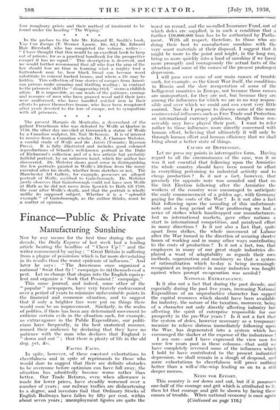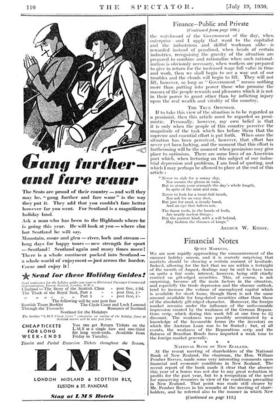Finance—Public & Private
Manufacturing Sunshine
NoT by any means for the first time during the past decade, the Daily Express of last week had a leading article bearing the headline of " Cheer Up ! " and the writer commenced by saying : " Great Britain is suffering Irons a plague of pessimism which is far more devastating in its results than the worst epidemic of influenza." And later he says : " The Americans once organized a national ` Swat that fly ! ' campaigns to rid themselves of a pest. Let us change that slogan into the English equiva- lent and organize a ' Sock that Pessimist ! ' campaign."
This same journal, and indeed, some other of the " popular " newspapers, have very bravely endeavoured over a period of years to minimize unfavourable points in the financial and economic situation, and to suggest that if only a brighter face were put on things there would soon be an improvement. Similarly, in the realm of politics, if there has been any determined movement to criticize certain evils in the situation such, for example, as extravagance in the Public Expenditure, our politi- cians have frequently, in the best oratorical manner, roused their audience by declaring that they have no patience with the man who declares that England is
clown and out " ; that there is plenty of life in the old dog, yet, &c.
FACING FACTS.
In spite, however, of these constant exhortations to cheerfulness and in spite of reprimands to those who would dare to suggest that there are definite obstacles to be overcome before optimism can have full sway, the situation has admittedly become worse rather than better. Our Trade Returns, even when allowance is made for lower prices, have steadily worsened over a number of years ; our railway traffics are disheartening to a degree, and investors find that Ordinary Stocks of English Railways have fallen by fifty per cent. within about seven years ; unemployment figures are quite the
-worst on record, and the so-called Insurance Fund, out of which doles are supplied, is in such a condition that a further £10,000,000 loan has to be authorized by Parlia- ment. With all respect, therefore, to those who arc doing their best to manufacture sunshine with the very scant materials at their disposal, I suggest that it might he more to the point and might, in the long run, bring us more quickly into a land of sunshine if we faced more promptly and courageously the actual facts of the situation and some of the causes of the present prolonged depression. I will pass over some of our main causes of trouble such, for example, as the Great War itself, the conditions in Russia and the slow recuperation of some of the belligerent countries in Europe, not because those causes are unimportant, for they are not., but because they are among the influences for which we are in no way respon- sible and over which we could and can exert very little control. Nor do I propose to discuss some of the more controversial influences such as Free Trade and Protection or international currency problems, though these con- ceivably may have played their part. I want to refer rather to those influences more directly concerned with human effort, believing that ultimately it will only be through human effort and human efficiency that we shall bring about a better state of things.
CAUSES OF DEPRESSION.
Let me press my points in interrogative form. Having regard to all the circumstances of the case, was it or was it not essential that following upon the Armistice the whole country should have been roused to effort in everything pertaining to industrial activity and to cheap production ? Is it not a fact, however, that precisely the opposite note was sounded and that on the first Election following after the Armistice the workers of the country were encouraged to anticipate the early commencement of a golden age, with Germany paying for the costs of the War ? Is it not also a fact that following upon the sounding of this unfortunate note and a long period of War profiteering we had a series of strikes which handicapped our manufacturers, lost us international markets, gave other nations a start in international competition, and paralysed effort in many directions ? Is it not also a fact that, quite apart from strikes, the whole movement of Labour after the War turned in the direction of securing shorter hours of working and in many other ways contributing to the costs of production ? Is it not a fact, too, that employers in many of our great staple industries dis- played a want of adaptability as regards their own methods, organization and machinery so that a system of rationalization which to-day is being increasingly recognized as imperative in many industries was fought against when prompt co-operation was needed?
NATIONAL. EXTRAVAGANCE.
Is it also not a fact that during the past decade, and especially during the past five years, increasing National Expenditure of an unproductive character has sapped the capital resources which should have been available for industry, the nature of the taxation, moreover, being of a character not only directly affecting industry but affecting the spirit of enterprise responsible for our prosperity in the pre-War years ? Is it not a fact that the system of doles, however necessary as a temporary measure to relieve distress immediately following upon the War, has degenerated into a system which has encouraged the slacker at the expense of the industrious ?
I am sure—and I have expressed the view now for some few years past in these columns—that until we have completely reversed some of the influences which I hold to have contributed to the present industrial depression, we shall remain in a slough of despond, and mere exhortations to cheerfulnesS will prove nothing better than a will-o'-the-wisp leading us on to a still deeper morass.
NEED FOR EFFORT.
This country is nor down and out, but if it possesses one-half of the courage and grit which is attributed to it, then let that courage and grit be shown by facing these causes of trouble. When national economy is once again (Continued- ori • Finance—Public and Private (Continued from page 108.) the watchword of the Government of the day, when enterprise--and I apply that word to the capitalist and the industrious and skilful workman alike—is rewarded instead of penalized, when heads of certain industries, recognizing the gravity of the situation are prepared to combine and rationalize when such rational- ization is obviously necessary, when workers are prepared to give in return for the increased wage full value in time and work, then we shall begin to see a way out of our troubles and the clouds will begin to lift. They will not lift, however, so long as " Goverliment " means nothing more than putting into power those who promise the masses of the people rewards and pleasures which it is not in their power to grant other than by inflicting injury upon the real wealth and vitality of the country.
THE TRUE OPTIMISM.
If to take this view of the situation is to be regarded as a pessimist, then this article must be regarded as pessi- mistic. Personally, however, my own belief is that it is only when the people of this country perceive the magnitude of the task which lies before them that the supreme and essential effort is put forth. When once the situation has been perceived, however, that effort has never yet been lacking, and the moment that this effort is forthcoming will be the moment when pessimism may give place to optimism. There are some lines of an American poet which, when lecturing on this subject of our indus- trial depression and problems, I am fond of quoting, and which I may perhaps be allowed to place at the end of this article : "Never to sigh for a sunny sky, Nor mourn the gloom in vain,
But to strain your strength the day's whole length, In spite of the mist and rain.
Never to look for a trout-full brook, Nor ask for an easy shot, But just for sand, a steady hand, And an eye that falters not.
The finest tools, in the hands of fools, Are nearly useless things But the poorest kind, with a will behind, May fashion the thrones of kings."
ARTHUR. W. KIDDY.

















































 Previous page
Previous page